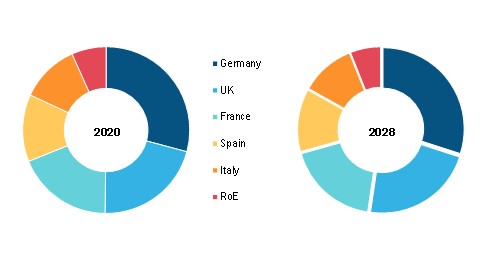
Published On: Mar 2022

Published On: Mar 2022

The integrated EEG segment by product type is estimated to lead the market growth during the forecast period.
According to a new market research study of “Europe EEG Machines Market Forecast to 2028 - COVID-19 Impact and Regional Analysis by Product Type, Application, End User and Country.” The Europe EEG machines market is expected to reach US$ 568.51 million by 2028 from US$ 321.04 million in 2021; it is estimated to grow at a CAGR of 8.5% from 2021 to 2028. The report highlights trends prevailing in the Europe EEG machines market and the factors driving market along with those that act as hindrances.
The incidence of neurological disorders is significantly rising among older people. However, due to various factors such as stress, genetic mutations, lifestyle habits, and related chronic conditions, the incidences are seen among people of all age groups. It is estimated that there are over 600 neurologic disorders, among which Parkinson's, Huntington's, Alzheimer's, muscular dystrophy, stroke, meningitis, epilepsy, dementia, migraine, and brain tumors are commonly seen. Similarly, the growing geriatric population is expected to influence the incidence of neurological disorders. According to the World Health Organization (WHO) statistics, 2018, the total population over 60 years of age will grow at a rate of 22% by 2050 from 12% in 2015. According to the Federal Interagency Forum on Aging-Related Statistics published in 2016, 35.8% of people aged 85 years and above have moderate or severe memory impairment. Therefore, owing to the above-mentioned statistics, the demand for EEG machines is expected to increase, which, in turn, will propel market growth.
Epilepsy is among the commonly diagnosed neurological disorders among the population across the world. It affects ~2% of the total world's population. However, the diagnosis of epilepsy is merely done in developed countries where the healthcare technologies are well-developed. The diagnosis of epilepsy requires several days of EEG monitoring, which is interpreted by a trained neurologist, a neurophysiologist, or a skilled EEG reader. Epilepsy is undiagnosed in most cases in humans, or the treatment is delayed due to a late diagnosis. Therefore, it is essential to diagnose epilepsy at an early stage.
Technological developments provide a better scope to diagnose epilepsy seizures automatically. Various developments have been undertaken to devise technology for automated epilepsy seizure detection. For instance, in 2017, Google Inc. partnered with Cleveland Clinic's Epilepsy Center to develop an artificial intelligence (AI) system. The collaboration aims to integrate AI with the EEG machines that will help detect epileptic seizures automatically from long-term EEG recordings of patients who have been evaluated in Cleveland Clinic's epilepsy monitoring unit. Such innovations are expected to encourage more developments for EEG machines and create growth opportunities for the market players in the near future.
Countries in Europe were severely affected due to the COVID-19 pandemic. Italy, Spain, and France have reported the highest number of positive cases and have registered the maximum number of deaths.
The EEG machine market witnessed some shortfall at the beginning of the COVID-19 crisis, owing to disruption in supply chain and demand because of lockdowns announced by the majority of European countries. As per the news article by Euronews, in Italy, due to the COVID-19 emergency, access for thousands of cancer patients in need of chemotherapy, scans, transplants, and surgeries has become difficult. According to the research led by Codice Viola— a charity that supports pancreatic cancer patients—more than 1,000 surgery patient patients' appointments for chemotherapy or radiotherapy were suspended. Additionally, 64% of surgical procedures were postponed, and more than half have had follow-up appointments rescheduled. In the Netherlands, the healthcare system is under stress due to the rising number of COVID-19 patients.
Based on product type, the Europe EEG machine market is segmented into integrated EEG and portable EEG. In terms of application, the Europe EEG machines market is segmented into disease diagnosis, trauma and surgery, sleep monitoring, anesthesia monitoring, and others. Based on end user, the Europe EEG machines market is segmented into hospitals, diagnostic centers, ambulatory surgical centers, research laboratories, and others. Geographically, the Europe EEG Machines market is sub-segmented into Germany, UK, France, Spain, Italy and Rest of Europe.
Koninklijke Philips N.V., Medtronic, Natus Medical Incorporated, Nihon Kohden Corporation, Fresenius SE & Co. KGaA, Advanced Brain Monitoring, D & DJ BURTON HOLDINGS, Cephalon A/S and Cadwell Industries Inc are among the leading companies operating in the Europe EEG Machines market.
Europe EEG Machines Market, By Country (% Share)
Contact Us
Phone: +16467917070
Email Id: sales@businessmarketinsights.com